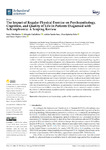Mostrar o rexistro simple do ítem
The Impact of Regular Physical Exercise on Psychopathology, Cognition, and Quality of Life in Patients Diagnosed with Schizophrenia: A Scoping Review
| dc.contributor.author | Carballeira, Eduardo | |
| dc.contributor.author | Vila Barrios, Lucía | |
| dc.contributor.author | Varela-Sanz, Adrián | |
| dc.contributor.author | Iglesias-Soler, Eliseo | |
| dc.contributor.author | Dopico-Calvo, Xurxo | |
| dc.date.accessioned | 2024-03-04T11:10:40Z | |
| dc.date.available | 2024-03-04T11:10:40Z | |
| dc.date.issued | 2023-11-21 | |
| dc.identifier.citation | Vila-Barrios, L.; Carballeira, E.; Varela-Sanz, A.; Iglesias-Soler, E.; Dopico-Calvo, X. The Impact of Regular Physical Exercise on Psychopathology, Cognition, and Quality of Life in Patients Diagnosed with Schizophrenia: A Scoping Review. Behav. Sci. 2023, 13, 959. https://doi.org/10.3390/bs13120959 | es_ES |
| dc.identifier.issn | 2076-328X | |
| dc.identifier.uri | http://hdl.handle.net/2183/35774 | |
| dc.description.abstract | [Abstract] The presence of less healthy lifestyle habits among individuals diagnosed with schizophrenia which can contribute to the escalation of physical disorders and exacerbation of psychological symptoms is well documented. The present scoping review aims to synthesize and evaluate the available evidence regarding the impact of regular physical exercise on psychopathology, cognition, and quality of life (QoL) in patients diagnosed with schizophrenia. A literature search was performed across Web of Science, SCOPUS, PubMed, and SPORTDiscus for randomized control trials published up to April 2022. Two independent reviewers applied the selection criteria and a third reviewer resolved discrepancies. A total of twelve studies were included, of which nine used endurance training and three used concurrent training (one of these additionally used resistance training). The results reveal benefits of various modalities of supervised regular exercise in the psychopathology of schizophrenia. Furthermore, regular endurance training seems to improve cognitive function in patients with schizophrenia and promote their QoL; however, results are inconclusive with respect to this last variable. The assessment of methodological quality in the reviewed articles indicates a high overall risk of bias, particularly in relation to deviations from intended interventions and the selection of reported results. Furthermore, an assessment of exercise reporting revealed that only 5 out of 19 items were fulfilled in more than 50% of the articles. Future research is needed to evaluate the effects of different training modalities and the optimal dose–response relationship in patients diagnosed with schizophrenia. | es_ES |
| dc.language.iso | eng | es_ES |
| dc.publisher | MDPI | es_ES |
| dc.relation.uri | https://doi.org/10.3390/bs13120959 | es_ES |
| dc.rights | Creative Commons Atribución (CCBY 4.0) | es_ES |
| dc.rights.uri | http://creativecommons.org/licenses/by/3.0/es/ | * |
| dc.subject | Schizophrenia | es_ES |
| dc.subject | Psychopathology | es_ES |
| dc.subject | Quality of life | es_ES |
| dc.subject | Cognition | es_ES |
| dc.subject | Physical exercise | es_ES |
| dc.title | The Impact of Regular Physical Exercise on Psychopathology, Cognition, and Quality of Life in Patients Diagnosed with Schizophrenia: A Scoping Review | es_ES |
| dc.type | info:eu-repo/semantics/article | es_ES |
| dc.rights.access | info:eu-repo/semantics/openAccess | es_ES |
| UDC.journalTitle | Behavioral sciences | es_ES |
| UDC.issue | 13 | es_ES |
Ficheiros no ítem
Este ítem aparece na(s) seguinte(s) colección(s)
-
GI-PHG - Artigos [118]






